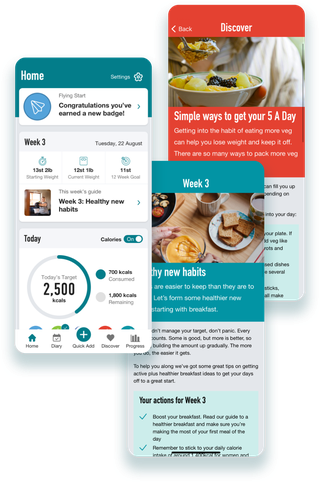Best Diet for Wight Loss
Lose weight
If you're overweight, losing weight has many health benefits. Making small, simple changes to what and how much you are eating and drinking can really help you lose the pounds.
![]()
Download the free NHS Weight Loss Plan
Download the free NHS Weight Loss Plan to help you start healthier eating habits, be more active, and start losing weight.
The plan is broken down into 12 weeks so you can:
- set weight loss goals
- use the BMI calculator to customise your plan
- plan your meals
- make healthier food choices
- get more active and burn more calories
- record your activity and progress
Don't worry, the app makes it easy for you – just take it one week at a time. Let's make "one day" today!



More help to lose weight
Did you know?
Small changes (like swapping sugary drinks for water or ditching sugar from your tea) can make a big difference in the long term.
Featured recipe
A little help to get you started
You may prefer using one of these weight loss plans. We have teamed up with some fantastic organisations to bring you these special offers:
Get going for free
Introductory offers
Healthy Lifestyle Services
Did you know your local authority may run a Healthy Lifestyle Service? If they do, this can include free coaching, advice and support to help you find ways to move that you'll enjoy. Contact your local authority for more details.
How to eat healthier meals
It can be tricky to know what to do with your meals if you're trying to lose weight. Here are some quick tips to help.
![]()
Veg: go for 2 or more
Aiming for 2 or more portions of veg in a main meal means half your plate.
![]()
Protein: prize it!
Always include some protein – like beans, pulses, fish, eggs, meat or other types. It helps you stay full.
![]()
Carbs: stick to wholegrain
Carbs like potatoes, bread, rice or pasta should make up no more than a third of your meal.
![]()
Fish: try twice a week
If you eat fish, try to have 2 portions a week. At least 1 portion should be oily fish like sardines, salmon or mackerel.
![]()
Dairy: keep it light and low
Pick lower-fat and lower-sugar options for milk, cheese and yoghurts.
![]()
Oils: choose unsaturated
Go for olive, sunflower and rapeseed oil, which have unsaturated fats.
![]()
Spreads: be sensible
Choose lower-fat spreads and only eat it in small amounts.
![]()
Water: stay hydrated
Drink 6 to 8 cups of fluid a day. Water, tea, coffee, soup... They all count!
Get active
Being healthier is not just about what you eat – it's also about regular physical activity. Even 10 minutes a day counts!
Check out our tools and tips on weaving exercise into your daily routine.
Why should I lose weight?
Gaining weight is often a gradual process – it happens over the years as a result of modern-day life and the odd unhealthy habit.
Extra weight causes fat to build up around vital organs, making it harder for the body to fight against diseases like cancer, heart disease and now COVID-19.
If you are overweight or living with obesity, lowering your weight can help reduce your risk of developing serious diseases.
You can learn more about obesity and get support from Obesity UK, the leading charity dedicated to supporting people living with obesity.
Did you know?
Veggies keep you full for longer. They are low in calories and high in fibre – they make great snacks too.
Type 2 diabetes
Type 2 diabetes causes the level of sugar in the blood to become too high.
It can lead to serious complications such as sight loss, kidney failure, heart attack and stroke. You can reduce your risk by eating more healthily, losing weight and being more physically active.
You may be at a higher risk if you:
- carry extra weight, especially around your middle
- are from South Asian, African-Caribbean or Black African descent
- have a parent, brother, sister or child with type 2 diabetes
To find out if you're at risk of type 2 diabetes, take a couple of minutes to check your risk score.
If you have been diagnosed with type 2 diabetes - get free NHS support online to help you achieve and maintain a healthy weight.
Take care of your mind too
Your mental wellbeing is just as important as your physical health.
Answer 5 quick questions to get your free mind plan from Every Mind Matters – including tips to help you deal with stress and anxiety, improve your sleep, boost your mood and feel more in control.
Get Your Mind Plan

Dietary advice
Better Health cannot provide individual dietary advice. If you or someone you care for has special dietary requirements, medical needs or an eating disorder, please seek advice from a registered healthcare professional. If you would like more information on eating disorders, Beat has lots of useful advice for adults and children.
Source: https://www.nhs.uk/better-health/lose-weight/
0 Response to "Best Diet for Wight Loss"
Post a Comment